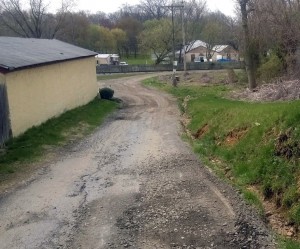Longer term: Twp. will propose rehab options for private road
By Rick Marts, Staff Writer, Kennett Times

Kennett Township has come up with a short term solution to dealing with the nearly impassable Ways Lane: fixing the numerous potholes on the private road, so that emergency vehicles can safely access the area. The long-term solution, township officials, will be largely up to the 18 owners of the road, mostly local residents and businesses.
KENNETT —The township’s Board of Supervisors, the board’s engineer and solicitor, and less than half of the 18 property owners along Ways Lane agreed Wednesday on a process — not a solution — for addressing Ways Lane’s severely deteriorated and unsafe conditions.
Dave Sander, the township’s solicitor, said, “At this point, we assume that no one wants to live on a road that is impassable and damages vehicles that travel it. The question is what is the best way for the township to help property owners?”
Ways Lane is owned by the 18 property owners along its one-mile stretch from Cypress at the Italian-American Club south, then curving west to its intersection with S. Walnut. Sander suggested that the township could, without excessive cost, fill the potholes with asphalt millings “to temporarily fix the unsafe conditions so that emergency vehicles, as well as property owners can safely access the road.”
Sander continued, however, to say that the township could undertake no more permanent repair that would be needed for stormwater management, rehabbing the substructure, and applying oil and chip coatings, because the township does not own the road. Without ownership, the township would at least need permission from the owners to bring the road up to acceptable standards.
He noted two legal means of providing permission: they are a “deed of dedication” and a “deed in lieu of condemnation.” He said, “One of these would be needed for a publicly-funded, long-lasting solution for the road.” He said either would involve many conversations among the township and each owner so that all parties are clear as to the rights each has.
Township Manager Lisa Moore said a permanent repair would be expensive—a study done 10 years ago showed that an amount in the range of $2 million would be necessary.
Tom Burke, representing the township’s engineer, Remington Vernick, said that the kind of job to make the road usable would be big but not impossible. He said, “A complete site-survey would be needed to determine what parts of the property would be affected in repairing the road. For example, a lot of silt and mulch is contaminating the storm water run-off and the cause of this would need remediation. Also, we don’t know how the railroad right-of-way will affect the actual route of the rehabbed road.”
Supervisor Leff noted that competition exists for township funds for this kind of work. He said, “Other residents and property owners would also like us to address their infrastructure problems.”
One of the property owners present, Lou Caputo, said, “I believe the majority of property owners would contribute to the reclamation of the road. The last time this came up, we had one owner hold out on us and the deal sort of fell through.”
Board Chairman Stevens noted that getting together the owners to manage and pay for the reclamation of the road would be more effective than having the township do it all. Owners would have more control if they did it themselves.
Stevens also said that in the short term the township can get emergency services on the road by filling the holes with millings. In the medium term, it would be looking at repaving the road and, for long term commercial development, it would need utilities and sewers.
Caputo stressed that he believes that almost all the owners would fall in line if the township agreed to manage the effort.
Sander suggested that assessing all owners an appropriate amount according to their share of the property is a legal means of funding the project. Caputo said, however, he believes this would work only if grant money were available, because the owners cannot afford $2 million.
The discussion ended with this plan: the engineer will develop several options that run the rehabbing gamut from doing it at less than township standards to meeting and possibly going beyond the standards. For example, Stevens requested including hydrology issues in at least one of the options.
With options and cost estimates in hand, the BOS will review the engineer’s report and then notify the owners of the next meeting. Township Manager Moore said this could take at least another month. In the meantime, millings will be used to fill in pot holes for the sake of safety and law enforcement.




